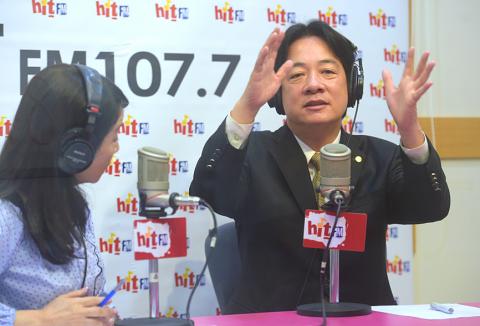Tainan Mayor William Lai (賴清德) yesterday described the nation’s relationship with China as one between friends, but added that he advocates Taiwanese independence.
Lai, a member of the Democratic Progressive Party (DPP), said his stance on cross-strait relations is clear, which is in favor of “Taiwanese independence and that stance will not change no matter what position I hold.”
However, he said his attitude toward China is friendly and his strategy is flexible, adding that he would seek common ground and put aside differences in cross-strait exchanges to enhance bilateral understanding.

Photo: Chang Chia-ming, Taipei Times
He was asked during a radio interview about the differences between his approach to China and that of Taipei Mayor Ko Wen-je (柯文哲), an independent.
Both mayors have made friendly remarks about China over the past few weeks.
Lai spoke of “feeling an affinity toward China while loving Taiwan,” while Ko, during a visit to Shanghai to attend a twin-city forum, said “both sides are of a family.”
Lai yesterday said Ko defined cross-strait ties as a relationship between a couple, while he defined them as between friends.
What they have in common is that neither accepts the so-called “1992 consensus,” Lai said.
The “1992 consensus” — a term former Mainland Affairs Council chairman Su Chi (蘇起) admitted making up in 2000 — refers to a tacit understanding between the Chinese Nationalist Party (KMT) and the Chinese government that both sides acknowledge there is “one China,” with each side having its own interpretation of what “China” means.
“Taiwanese independence is the broadest consensus in Taiwanese society,” Lin said.
The “1992 consensus” and the efforts to have the DPP abandon its pro-independence platform or sign a cross-strait peace agreement are all ploys used by China to divide Taiwan with the aim of annexing the nation, Lai said.
He also described cross-strait relations as international relations and said that when deciding on the nation’s direction, the goal should be maximizing the welfare of the public rather than moving within boundaries set by big powers.
“China is not to be feared. What is to be feared is that we cannot unite,” he said.
Regarding former president Ma Ying-jeou’s (馬英九) remark that Chinese authorities “will not accept or be happy with” Lai feeling an affinity toward China while loving Taiwan, Lai said the remark reflected Ma’s problem.
“Ma cares too much about whether China is happy and ignores the will of Taiwanese,” Lai said.

Alain Robert, known as the "French Spider-Man," praised Alex Honnold as exceptionally well-prepared after the US climber completed a free solo ascent of Taipei 101 yesterday. Robert said Honnold's ascent of the 508m-tall skyscraper in just more than one-and-a-half hours without using safety ropes or equipment was a remarkable achievement. "This is my life," he said in an interview conducted in French, adding that he liked the feeling of being "on the edge of danger." The 63-year-old Frenchman climbed Taipei 101 using ropes in December 2004, taking about four hours to reach the top. On a one-to-10 scale of difficulty, Robert said Taipei 101

Nipah virus infection is to be officially listed as a category 5 notifiable infectious disease in Taiwan in March, while clinical treatment guidelines are being formulated, the Centers for Disease Control (CDC) said yesterday. With Nipah infections being reported in other countries and considering its relatively high fatality rate, the centers on Jan. 16 announced that it would be listed as a notifiable infectious disease to bolster the nation’s systematic early warning system and increase public awareness, the CDC said. Bangladesh reported four fatal cases last year in separate districts, with three linked to raw date palm sap consumption, CDC Epidemic Intelligence

Two Taiwanese prosecutors were questioned by Chinese security personnel at their hotel during a trip to China’s Henan Province this month, the Mainland Affairs Council (MAC) said yesterday. The officers had personal information on the prosecutors, including “when they were assigned to their posts, their work locations and job titles,” MAC Deputy Minister and spokesman Liang Wen-chieh (梁文傑) said. On top of asking about their agencies and positions, the officers also questioned the prosecutors about the Cross-Strait Joint Crime-Fighting and Judicial Mutual Assistance Agreement, a pact that serves as the framework for Taiwan-China cooperation on combating crime and providing judicial assistance, Liang

US climber Alex Honnold left Taiwan this morning a day after completing a free-solo ascent of Taipei 101, a feat that drew cheers from onlookers and gained widespread international attention. Honnold yesterday scaled the 101-story skyscraper without a rope or safety harness. The climb — the highest urban free-solo ascent ever attempted — took just more than 90 minutes and was streamed live on Netflix. It was covered by major international news outlets including CNN, the New York Times, the Guardian and the Wall Street Journal. As Honnold prepared to leave Taiwan today, he attracted a crowd when he and his wife, Sanni,